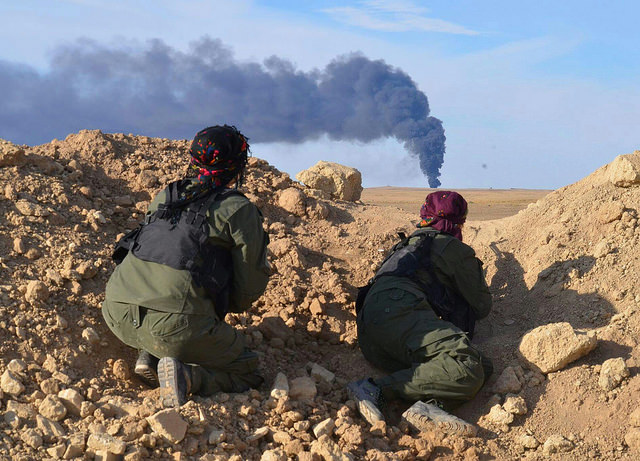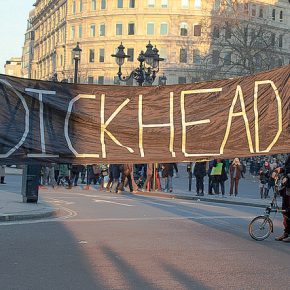The predominantly Kurdish district of Afrin in northwestern Syria has been under near-continuous siege for four years but remained relatively calm, attracting hundreds of thousands of displaced people. Now, it is under threat from Turkish military operations in Syria.
BEIRUT– Surrounded by olive trees and an array of hostile neighbors, the predominantly Kurdish district of Afrin has largely escaped the headlines during the war. Its relative calm has drawn hundreds of thousands of people fleeing violence in neighboring regions but is now threatened by an advancing Turkish offensive in Syria known as “Operation Euphrates Shield.”
“It’s like an isolated island,” said Mohammad Sulayman, director of Zaytoun, a local aid group.
Government forces withdrew from Afrin in 2012, and soon afterwards the Popular Protection Units (YPG), the main Syrian Kurdish fighting force, took control. Although the district was declared part of the self-proclaimed autonomous territory of Syrian Kurdistan in January 2014, it is separated from the other cantons by both geography and a multilateral four-year siege. To one side of Afrin is a sealed Turkish border; government troops block passage to nearby Nubul and various Turkish-backed rebel factions and the jihadist group Jabhat Fatah al-Sham (JFS) block the remaining sides.
Government airstrikes and violent clashes in neighboring districts in Idlib and Aleppo have driven hundreds of thousands of people to the relative calm of Afrin. But the nearly four-year siege has left the small district struggling to manage with the influx of internally displaced people (IDPs). Its population has risen to more than a million, and the YPG has implemented a state of emergency amid fear of potential terrorist attacks.
Disagreements between Afrin’s neighbors and the YPG mean residents constantly lack food and fuel; prices have skyrocketed as smugglers and businessmen manipulate the market, said local journalist Amina Mesto. “The price of fuel has gone through the roof, increasing people’s suffering in the cold winter,” said Mesto, who was a philosophy teacher at an Aleppo high school before the war and fled to Afrin after she was persecuted by Syrian security forces for her criticism of airstrikes on civilians.
Complex Turkish regulations and politics, in combination with further complications and taxes imposed by hardline Islamists factions surrounding the district, hinder the ability of humanitarian organizations to operate in Afrin, Sulayman said. Small organizations like Zaytoun provide whatever aid is possible in Afrin and its two adjacent IDP camps, Robari and Shahbaa.
Turkey launched its military operation in Syria in August 2016, with the aim of pushing back the so-called Islamic State from its border and thwarting Kurdish ambitions to consolidate their hold on predominantly Kurdish regions in northern Syria. Despite Kurdish-led forces being one of the most effective groups fighting ISIS, Ankara views the YPG as an extension of its own Kurdish insurgency, which has been fighting for autonomy since the 1980s.
“That’s the problem,” said Nada Homsi, a graduate student at the American University in Beirut researching Kurds in northern Syria. “They [Ankara] don’t see the difference between self-determination and the Islamic State.”
https://www.youtube.com/watch?v=wjQzvVgQMQE
Isolated from the rest of YPG-controlled areas, residents in Afrin fear their geographic location will make them more vulnerable to Turkish ambitions. Afrin’s borders and YPG positions have been repeatedly shelled by Turkish forces and the Syrian rebel factions it supports, and earlier this week the Turkish army uprooted thousands of olive trees around Afrin, Mesto said, as its forces advanced to within 300 meters (328 yards) of the district.
“There is a fear within Afrin’s residents that the area will be targeted by the Turkish intervention after the Turkish military spread along the border line,” said Mesto. “It is trying to provoke the YPG to return fire.”
Ankara’s actions have not been limited to military ones. Afrin’s main water supply, known locally as the Black River, is a tributary of the Orontes River, which rises from the Kartal Mountains in Turkey. Last year, Turkey cut off the Black River’s flow, Mesto said, damaging crops. Residents now largely depend on wells for drinking water, but the lack of electricity and fuel to run generators makes obtaining the water extremely difficult. Afrin’s electric line has been out for four years; when ISIS controlled neighboring Tel Rifaat, it destroyed the power plant there and it has not been repaired since.
“Turkey is in no way interested in having a successful Kurdish population near its own borders,” said Homsi, and the YPG does not want to fall for the bait. “They don’t want to fight the Turks and ISIS at the same time.”
Warming ties between Russia and Turkey, which have long supported opposing sides in the Syrian conflict, could pose an additional threat to the Kurds. The U.S. is an important backer of the YPG, but it is unclear whether the new administration will prioritize them in the fight against ISIS, or whether it will be a casualty of President Donald Trump’s desire to strengthen relations with Russia.
“The YPG are the second largest force in Syria – that determines that they will not be ignored politically or militarily,” said Azad Mamo, a media activist and Afrin native.
But the YPG were excluded from peace talks in Kazakhstan earlier this week sponsored by Turkey and the government’s key allies, Russia and Iran. The only Kurdish delegation present at the talks was the Kurdish National Council (KNC), an affiliate of the Syrian Opposition Coalition (SOC) that Mesto described as “extremely far from the Kurdish reality.”
The YPG “are being sidelined intentionally,” Homsi said. The YPG controls nearly 20 percent of Syrian territory, and nearly 12.5 percent of Syria’s current population are in Kurdish-controlled areas.
Neither the government nor the opposition have provided guarantees towards Syrian Kurdish rights, said Sulayman, further alienating Kurds.
“The government is Baathist, nationalist and racist, and the Islamist opposition is racist as well,” said Sulayman. “They have different points of view, but the one thing they can all agree on is the Kurds – that they should have nothing.”
This article originally appeared on Syria Deeply, and you can find the original here. For important news about the war in Syria, you can sign up to the Syria Deeply email list. Photograph courtesy of Kurdish Struggle. Published under a Creative Commons license.





